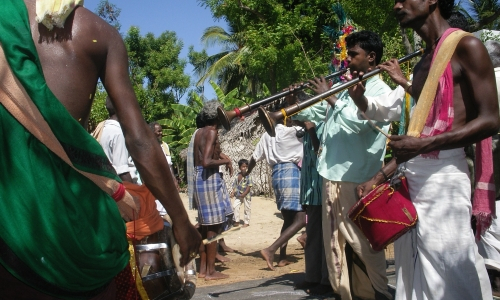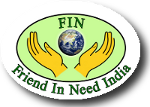
After the Tsunami of December 2004, Mrs. (Prof. Dr.) Shyama V. Ramani, an Indian economist based in France, adopted an isolated coastal village called Kameswaram in Tamil Nadu, India near the town of Nagapattinam. The objective of her project was to help the village attain fundamental developmental goals like income security, basic sanitation and health standards, gender equality and security for children through the introduction of innovations (new to Kameswaram) in the form of new structures, new technology, new management routines and new social norms.
During the first four years (2005-2009), she raised funds for other Indian NGOs to implement development projects in Kameswaram and documented the progress. She was helped by many students from France. To manage the collaboration, the non-profit organization Association Un-Ami (meaning “a friend” in French) was created in Reims, France in February 2006. This was followed by the creation of the non-profit association, Friend-in-Need in Tiruchirapalli, Tamil Nadu, in June 2006, as a sister organization to Association Un-Ami. FIN was, and continues to be, supported by families in Europe and India. All fundraising and administrative work of Associations Un-Ami and FIN are carried out by volunteers.
In 2009, it was noticed that many of infrastructure installations were not being efficiently used or not being used at all, because of a variety of reasons ranging from: (A) a lack of awareness, a lack of skills, a lack of motivation – on the part of the villagers; (B) faulty construction on the part of the project implementers; and (C) a lack of a local agency in the village which could maintain and repair the installations. In fact, there are no organizations that maintain and repair installations put in by charities and/or development agencies in most villages. Thus, from 2009 to 2012, Shyama and her sole staff member Mr.Paranjothi repaired whatever they could. Thereafter, it has undergone several transformations engendered by its learning as well as its societal impact.
Presently, it serves as a teaching and research lab, creating frugal pro-poor eco innovations and testing them out in Kameswaram village, which serves as a living rural lab. It also designs solutions, undertakes
research, offers teaching modules and organizes events – for other societal stakeholders such as public agencies, NGOs, firms, CSR foundations and civil society. The focus is always on the WASH variables: Waste management, water, sanitation, hygiene, hygiene behaviour and their transformation into economic and social value.
